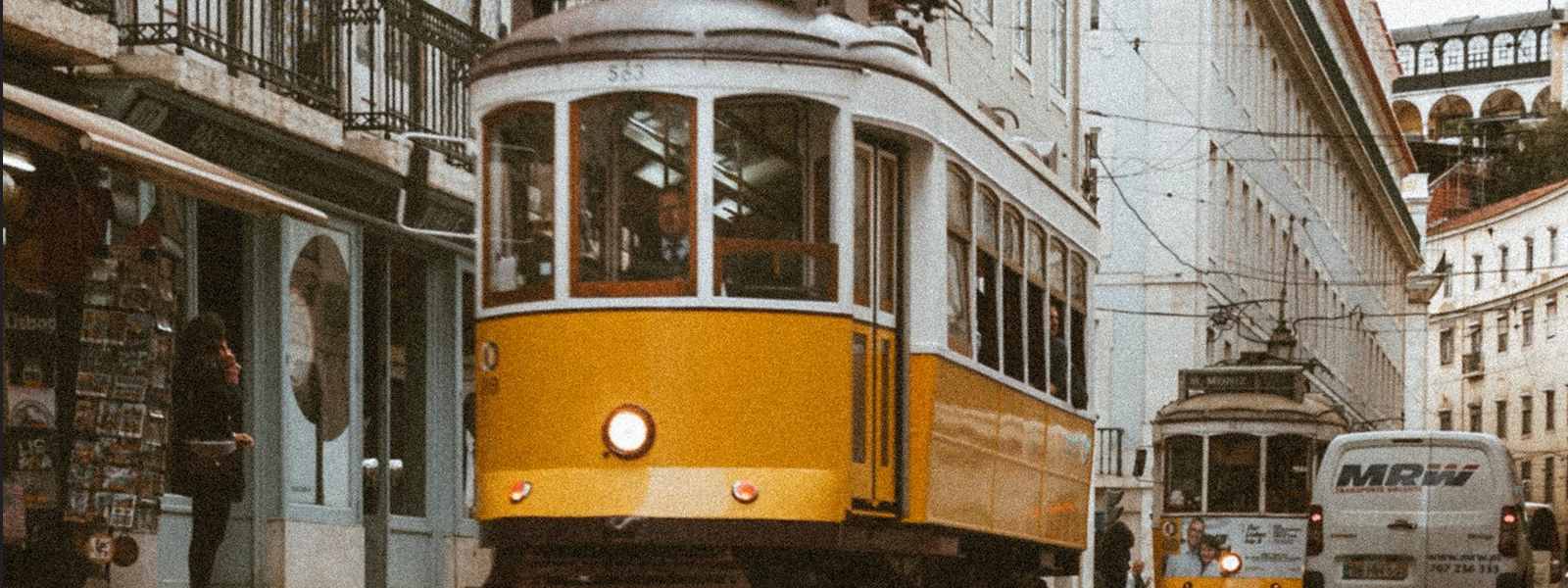As far as I can tell, there has never been a rulebook written about how to grieve, which is maybe why I’m here, stood on a tightly packed tram somewhere in the middle of Lisbon. It screeches to a stop at a corner, a bell rings out, and a quartet of Americans clamber aboard, jostling themselves into space that doesn’t exist. They look like Florida. I look away and my eyes settle on the window of a music shop adorned with album covers: portraits of rugged mustachioed men and deftly lit olive-skinned women. It has a tiled surround in floral designs every kind of blue, and on days before these I’d see it as beautiful. From inside the shop, a song begins playing: an arpeggio guitar, a smoke-sultry voice. I don’t understand Portuguese, but the ache in her voice seeps into my soul, and a part of me beyond me understands. We pull away and as the music fades from earshot, I feel I’ve been emptied. I look up, and from third story dwellings in Alfama, clean laundry hangs on lines like Buddhist prayer flags waiting for the wind to purify the air.
On a day ten years before, she’d planned for us to take the 28. But it was either drizzly, or cold, or there was some other reason I’d come up with that clung to me and wouldn’t let go. The thing was, I didn’t want to and she did and I won. And my prize: she sat the day in bed, cooped up inside a shelter made of bedsheets and knees. By the time she ran out of novel the day had passed. We showered separately, dressed, and headed out for a dinner that was nothing but ritual, a pigheaded waste of a day that need never have been lost.
A young girl is sat next to me, her arms wrapped around a careworn satchel brimming with schoolbooks. The tawny hide is faded and scarred, the edges frayed, and the bronze of the buckles has worn to the pallor of tin. Perhaps it once belonged to her grandmother. Cradled in her own world, she’s mouthing the words of a newly learnt song or rhyme, her head tick-tocks gently from side to side. She stops, and her brow becomes taught with query, she then appears to remember what she mislaid, and begins all over again. At the next stop she burrows her way to the exit like it’s a game she plays every day. I pray that she doesn’t get to grow up too quickly, but in all honesty, I don’t think Gods are listening anymore.
Now sitting in a coffee shop near the Elevador, I open a notebook. Write down what you’re feeling, it’ll help you heal, someone suggested, though not the same someone who said that a couple of days away would do me good. The page of the notebook only bears the stain of yesterday’s coffee, so I close it, and decide to phone home. It rings once before Ben answers. He says that Grandma and Josh have gone to football practice. I ask him why he didn’t go,
“I didn’t fancy it,” he says, in a voice so fragile it kills me.
“When are you coming home?”
“Tomorrow. I’ll be home by dinner time.”
“Is Mum coming with you?”
“No, Ben,” is all I can say, because I haven’t yet found the words he needs to hear. And perhaps I never will.
…
Biography
Lee Hamblin is a Londoner living in Greece for the last decade. He’s had stories published with Moon Park Review, Stories for Homes Vol. 2, Bath Flash Anthology, Blue Fifth Review, Ellipsis Zine, Fictive Dream, STORGY, Flash Frontier, Spelk, Reflex, F(r)online. He tweets @kali_thea and puts words here: https://hamblin1.wordpress.com.
Image: John Jason





